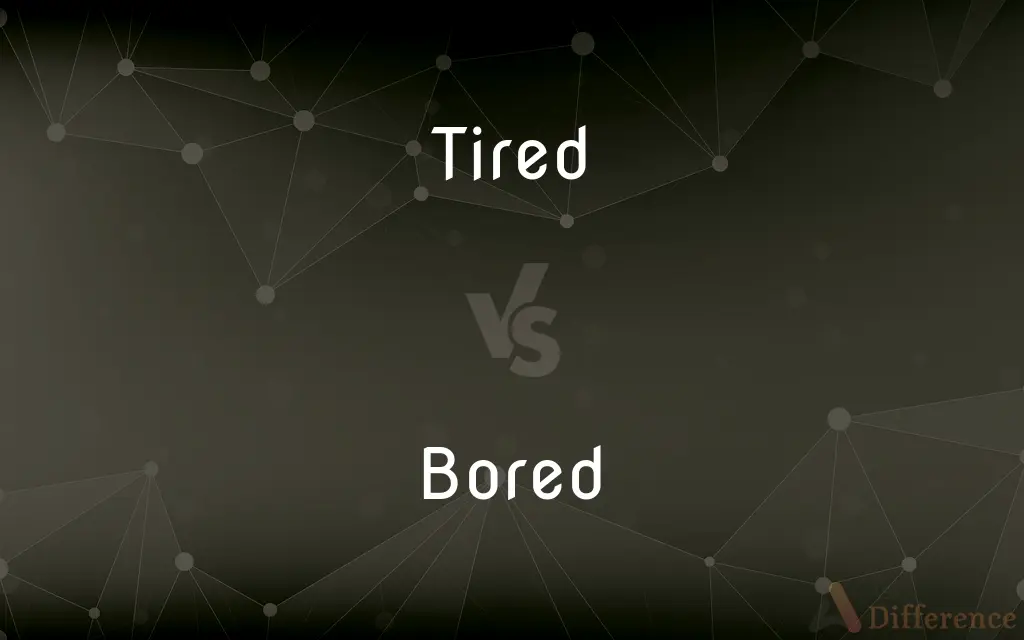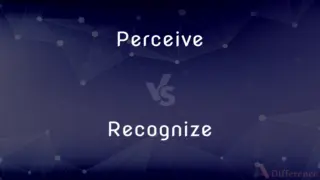Tired vs. Bored — What's the Difference?
By Urooj Arif & Maham Liaqat — Updated on April 20, 2024
Tiredness refers to a state of physical or mental fatigue, needing rest, while boredom signifies a lack of interest or stimulation, leading to feelings of restlessness.

Difference Between Tired and Bored
Table of Contents
ADVERTISEMENT
Key Differences
Tiredness is a physiological and psychological state resulting from exertion, lack of sleep, or the natural circadian rhythms of the body, necessitating rest or sleep to recover energy. Conversely, boredom arises when an individual feels unengaged or unstimulated by their environment or activity, leading to feelings of restlessness and dissatisfaction.
While tiredness can be alleviated by resting or improving sleep habits, boredom typically requires a change in activity or seeking new forms of engagement to overcome the feeling of ennui. This distinction highlights how different interventions are needed to address each condition.
Tiredness often results in decreased energy levels, slower reaction times, and a reduced ability to concentrate or perform tasks effectively. On the other hand, boredom might not affect physical energy but can lead to a lack of motivation and difficulty in maintaining focus or interest in tasks.
Physiological responses to tiredness include yawning, drooping eyelids, and a desire to lie down, whereas boredom might manifest through fidgeting, wandering thoughts, and an active search for something more interesting to do.
The emotional impacts also differ; tiredness can lead to irritability and a decreased mood due to exhaustion, while boredom can cause frustration and a sense of emptiness from the lack of fulfilling activities.
ADVERTISEMENT
Comparison Chart
Definition
State of needing rest from fatigue or sleep deprivation
Feeling of uninterest due to lack of stimulation
Main Causes
Physical or mental exertion, lack of sleep
Lack of engagement or interest in current activities
Symptoms
Yawning, need for sleep, decreased performance
Restlessness, lack of focus, seeking new stimuli
Remedies
Rest, sleep, possibly caffeine
Change of activity, seeking new interests
Emotional Impact
Irritability, general fatigue
Frustration, feeling of emptiness
Compare with Definitions
Tired
Lacking energy or enthusiasm from fatigue.
She was too tired to attend the evening party.
Bored
Experiencing a sense of tediousness.
The lecture was so dull that half the class looked bored.
Tired
Resulting from or exhibiting fatigue.
His tired eyes struggled to stay open during the lecture.
Bored
Searching for something stimulating due to lack of excitement.
Bored, he flipped through channels looking for something interesting.
Tired
Worn out or not operating at full capacity.
After hours of driving, they were tired and decided to stop for the night.
Bored
Lacking interest in one’s current activity.
They were bored at the party and left early.
Tired
Feeling a need to rest or sleep due to exhaustion.
After the long hike, he felt incredibly tired.
Bored
Uninterested because of frequent exposure or lack of novelty.
He was bored with the same routine every day.
Tired
Drained of strength or energy.
The marathon left him feeling tired and sore.
Bored
Feeling weary because something is uninteresting or tedious.
She felt bored during the long, monotonous meeting.
Tired
Exhausted of strength or energy; fatigued.
Bored
To make a hole in or through, with or as if with a drill.
Tired
Impatient; bored
Tired of the same old sandwiches.
Bored
To form (a tunnel, for example) by drilling, digging, or burrowing.
Tired
Overused; hackneyed
A tired joke.
Bored
To proceed or advance steadily or laboriously
A destroyer boring through heavy seas.
Tired
Simple past tense and past participle of tire
Bored
To make weary by being dull, repetitive, or tedious
The movie bored us.
Tired
In need of some rest or sleep.
Bored
Past tense of bear1.
Tired
Fed up, annoyed, irritated, sick of.
I'm tired of this
Bored
A hole or passage made by or as if by use of a drill.
Tired
Overused, cliché.
A tired song
Bored
A hollow, usually cylindrical chamber or barrel, as of a firearm.
Tired
Ineffectual; incompetent
Bored
The interior diameter of a hole, tube, or cylinder.
Tired
Weary; fatigued; exhausted.
Bored
The caliber of a firearm.
Tired
Depleted of strength or energy;
Tired mothers with crying babies
Too tired to eat
Bored
A drilling tool.
Tired
Repeated too often; overfamiliar through overuse;
Bromidic sermons
His remarks were trite and commonplace
Hackneyed phrases
A stock answer
Repeating threadbare jokes
Parroting some timeworn axiom
The trite metaphor `hard as nails'
Bored
One that is wearingly dull, repetitive, or tedious.
Bored
Simple past tense and past participle of bore
Bored
Suffering from boredom; mildly annoyed and restless through having nothing to do.
The piano teacher's bored look indicated he wasn't paying much attention to his pupil's lackluster rendition of Mozart's Requiem.
Bored
Perforated by a hole or holes.
Bored
Tired of the world; bored with life.
Bored
Uninterested because of frequent exposure or indulgence. Opposite of interested.
Bored
Tired of the world;
Bored with life
Strolled through the museum with a bored air
Bored
Uninterested because of frequent exposure or indulgence;
His blase indifference
A petulent blase air
The bored gaze of the successful film star
Common Curiosities
Is it possible to be tired and bored at the same time?
Yes, one can be physically exhausted yet feel unstimulated and restless.
How can one overcome boredom?
Engaging in new or varied activities, or changing the environment can help alleviate boredom.
Can tiredness cause boredom?
Indirectly, yes; being too tired to engage in activities might lead to boredom.
What are typical activities to combat tiredness?
Resting, sleeping, or consuming caffeine are common ways to combat tiredness.
How does boredom affect mental health?
Prolonged boredom can lead to feelings of dissatisfaction and may negatively impact mental health.
What triggers boredom?
Boredom can be triggered by repetitive, monotonous activities or a lack of challenge in tasks.
What are the long-term effects of not addressing boredom?
Chronic boredom may lead to anxiety, depression, or decreased motivation.
What are physical signs of being tired?
Common signs include yawning, drooping eyelids, and a slumping posture.
What is the main difference between feeling tired and bored?
Tiredness relates to physical or mental exhaustion needing rest, while boredom stems from a lack of stimulation or interest.
Can changing one's routine help with tiredness?
Adjusting one's routine to ensure adequate rest and sleep can help alleviate tiredness.
Share Your Discovery

Previous Comparison
Coke vs. Flake
Next Comparison
Perceive vs. RecognizeAuthor Spotlight
Written by
Urooj ArifUrooj is a skilled content writer at Ask Difference, known for her exceptional ability to simplify complex topics into engaging and informative content. With a passion for research and a flair for clear, concise writing, she consistently delivers articles that resonate with our diverse audience.
Co-written by
Maham Liaqat















































